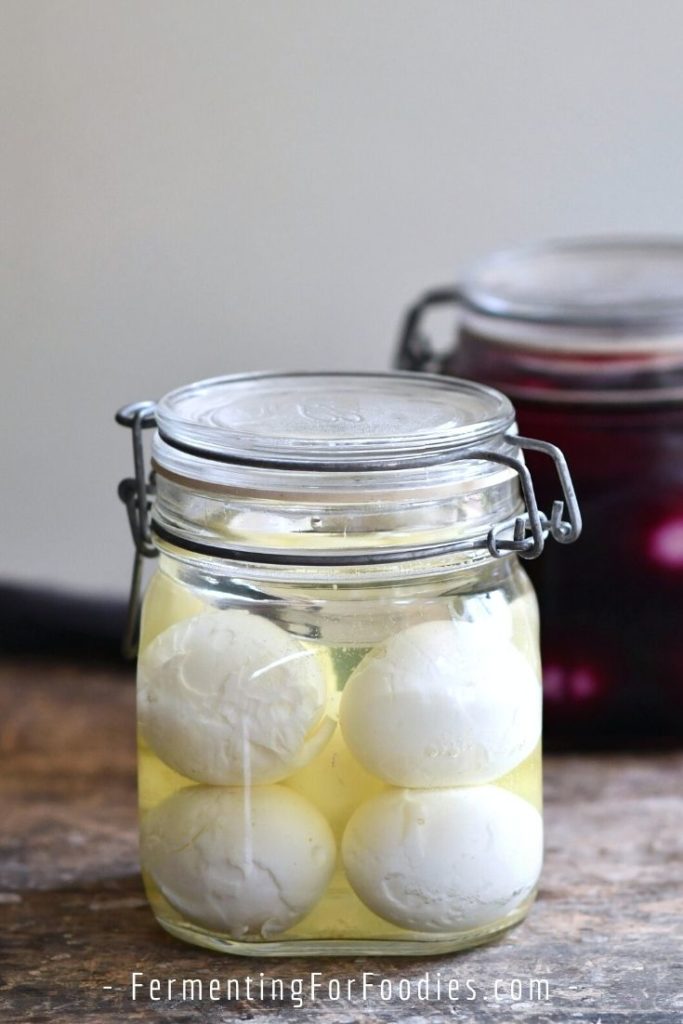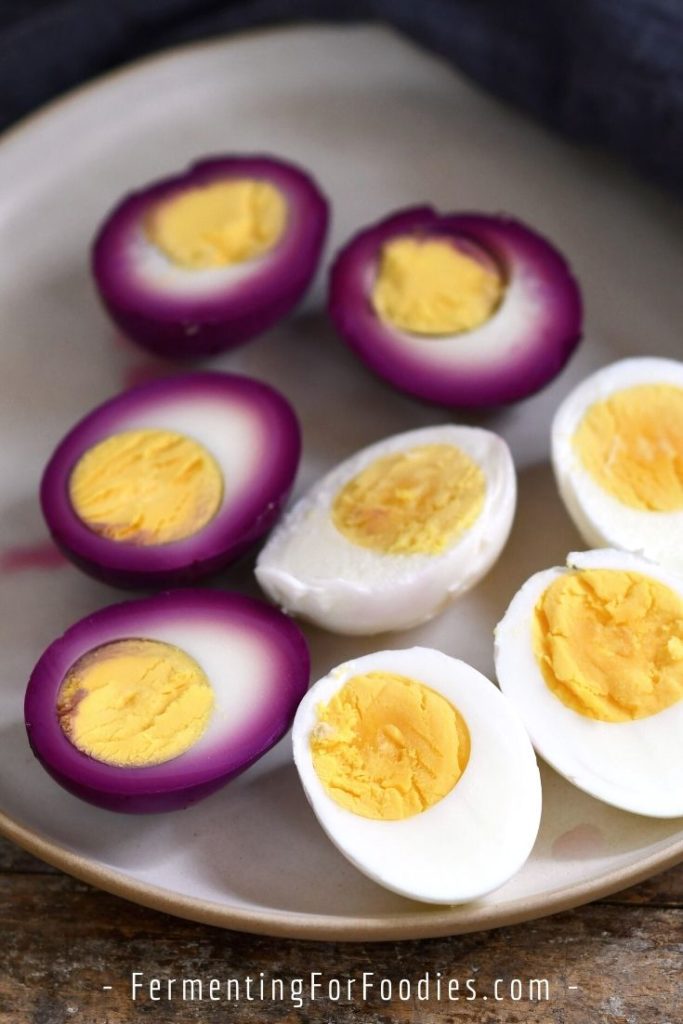Fermented eggs are SO much tastier than typical hard-boiled eggs. Perfectly salted and firm, they are delicious as a snack, in egg salad, or deviled eggs.

Fermented or Pickled eggs?
Officially fermenting is a form of pickling. So technically, fermented eggs are pickled!
However, typical pickled eggs are preserved with vinegar. The acidity of the vinegar provides flavor and preserves the eggs.
Fermenting uses bacteria, yeast, or mold to preserve eggs. This particular recipe focuses on bacteria and yeasts. However, miso, as a mold-ferment, also can preserve eggs.
Fermented eggs are every bit as easy and delicious as vinegar-pickled eggs. All you need is a good fermentation culture!
Flavors
Pickled eggs will be infused with whatever flavors are included in the brine. So I recommend playing around with all sorts of different flavors.
A few suggestions include:
- Dill: Use 2 sprigs of dill weed per jar.
- Garlic: 2 cloves of garlic will pack quite a bit of flavor!
- Onion: Peel and thinly slice one small onion. Add the onion slices to the jar. Fermented onions are delicious, so I’m sure you’ll enjoy them every bit as much as the eggs!
- Hot pepper: Enjoy a bit of heat by adding a hot pepper, sliced in half, to the jar.
- Peppercorns: 1 tsp of peppercorns will also add a bit of heat.
- Pickling spice: Add 2 tsp of pickling spice to infuse the eggs with flavor.
Colors
It’s easy to make colorful pickled eggs! Simply use a colorful starter!
Here are a few suggestions:
- The purple eggs (below) were fermented in fermented beet brine.
- Turmeric soda will give the eggs a pale yellow hue.
- Make pink eggs with beet kvass.

Salt-Brine Fermented Eggs
Salt-brined pickled eggs are the perfect hard-boiled eggs, nicely salted and firm! These fermented eggs are SO tasty and perfect for picnics, snacks, salads, or deviled eggs. Try making different flavors and colors. See the section above for more details.
- Prep Time: 10 minutes
- Cook Time: 10 minutes
- Total Time: 20 minutes
- Yield: 1 quart jar 1x
- Category: Pickles
- Method: Fermented
- Cuisine: British
- Diet: Vegetarian
Ingredients
- 2 cups of water, chlorine-free
- 1/4 cup of starter (see notes)
- 1 Tbsp salt
- 12 hard-boiled eggs, peeled
Instructions
- Mix the water, starter, and salt in a quart jar. Stir a few times until the salt is mostly dissolved. Alternatively, use the leftover brine from a vegetable ferment for the brine and culture.
- Fill the jar with the peeled hard-boiled eggs. Add any other flavorings that you want to include (see the section above for some ideas).
- Use a weight to keep the eggs below the brine. If necessary, add more water to ensure that the eggs are completely covered. The eggs need to be completely submerged in the brine.
- Cap the jar with a lid that will allow gas to escape during the ferment. A loosely tightened lid, pickle pipe, or fido jar all work well.
- Place the jar in a cool, dark location. A closet or kitchen cupboard is fine. Leave the eggs to ferment for 1 to 3 days.
- Store the pickled eggs in the fridge, and enjoy within 2 weeks.
Notes
- To make sure the ferment is mold-free, start by sanitizing the jar. Fill it with boiling water and let it sit for 5 minutes before pouring the water out.
- I’ve made fermented eggs with all sorts of different starters. They each bring their own unique flavor to the ferment. Here are a few suggestions: brine from a vegetable ferment, a homemade vegetable starter, cultured cider vinegar, kombucha, or whey.
- If you really want the starter to flavor the eggs, don’t add any water at all. Simply ferment the eggs in 2 cups of starter liquid. If the starter is already salty then there’s no need to add extra salt (it should be salty enough already).



What are the bacteria feeding on to make the lactic acid needed to preserve and flavor the eggs? I think there is not a lot of carbs in an egg .
Eggs are very low carb. However, proteins do ferment. As well, the brine acts to preserve the eggs.
I’ve been eating eggs that were fermented for 70 years and can tell you that they last a lot longer than a couple of weeks in a refrigerator.
As long as the seal ain’t broken and the look and smell good they will last for years
But I’m glad people are doing this.
But I can see what you mean, if I put a couple of jars in the refrigerator their won’t last two weeks because I’ll eat them before that
That’s awesome! However, for liability reasons, I can’t recommend waiting that long. 😉
Ha, ha, very funny. Of course, he didn’t mean the EGGS had been fermented for seventy years, right? That was the best laugh I’ve had in a while. 😉
I agree with George, I have eggs in a jar of old pickle juice (in the fridge) that have literally been in there for a decade with no issues.
The starter has all ready been fermented once .
The eggs in your picture are overcooked. For medium eggs add to boiling water and boil for 5 minutes. Remove, cover, and let sit for 3 minutes. For hard boiled let them sit covered for 5 minutes. Immediately chill in ice water and peel.
Thanks for your comment. I think exactly how long you need to cook an egg depends on the size of the egg. Really large eggs could take up to 16 minutes! In this recipe it’s better to over cook than under cook your egg, so my eggs are a tad over cooked.
On the subject of cooking a hard boiled egg.
Their may be more than one way, just to be kind.
Method of choice for this cook is as follows;
Method: Steam
Place eggs in a pot you can cover. Use a vegetable steaming basket to keep eggs just above the water.
About an inch of brought to steaming. Then set a timer fir 16-18 minutes.
Place the steamed eggs under cold running water to completely cool. Peel.
At this point I am set to Ferment my eggs….mmmm…so GoOd
I’ve never tried that. Enjoy your fermented eggs. Yum!
Steaming is great for fresh eggs as it helps with the peeling that can be very messy if the edges are less than a week old.
5-5-5. Instant pressure pot method. Perfect every time! Same as steaming only waaaaaay faster.
Thanks for the instructions! Once they’re fermented, should the eggs be stored in the fridge in the brine, or will that cause the pickling process to continue?
I would keep them in the brine in the fridge. The fermenting will slow significantly, and it’s less risky then moving them to a potentially unclean container. They’re so delicious, I’m sure you’ll eat them within a week!
I am right this minute on my third batch of of fermented eggs. I do mine in half gallon jars. Not only use for just eating as is, but great to have on hand to make eggs salad, potato salad, deviled eggs etc. I think fermenting is a great way of going back to the time of the way food was preserved by our great grandparents. Also making our own vinegars, fruit starters. Wish I had been into this stuff when my family was young.
That’s great!
Can I use ginger bug as a starter?
I haven’t tried that… but it should work. It would add that ginger bug flavour… so I’m not sure about how that will taste (ginger eggs?) Turmeric bug would be good though.
Best I’ve found so far, tho haven’t completed the process at X3 scale. I’m surprised, so far, at how little water that’s called for to brine, tho guessing the egg displacement will make up the space. Then too was surprised the quart-sized jar didn’t change in the instructions. No worries tho, cuz i used an outsized jar, out of loving memory of seeing jars of pickled eggs on diner counters, back in the day — the good ones. Thanks for this & please let’s all try to have good times thru these iffy daze.
Thanks for the note! The 3x button probably doesn’t adjust the jar size. It’s part of the recipe card app and not something I’ve specifically added information for. 🙂 It isn’t always perfect. Enjoy your pickled eggs!
Can you use the brine from another batch of fermented eggs as your starter for a new batch of fermented eggs?
As long as the eggs fermented well… yes!
Once you’ve eaten all the eggs from the refrigerated jar, can you jus add more eggs to the brine?
You can definitely add more eggs to the brine and stash it in the fridge.
Is it kind of risky to ferment them on the counter? Can they be put directly in a fridge?
I have been fermenting eggs this way for several years, and have never had them go off. I have had coloured Easter eggs go off after sitting out for 2 days, so I know the risk! The salt should keep away the bad bacteria, but if you are concerned then putting them in the fridge right away is a good idea.
Fermentation will not occur in the fridge. You have to do it at room temp.
Thanks for all your info Josef! Fermentation does still occur in the fridge, but much more slowly. If you’ve ever made fermented beverages, then you’ll know how they definitely continue to ferment! Cheers, Emillie
Hi! For the dark purple fermented eggs, do you just stick the boiled eggs into the brine from the beets? I just finished a jar of beets, and have the leftover brine in the fridge.
Or, do I follow your recipe above, and just use half a cup of the beet brine?
Thanks!
I mean, 1/4 cup of beet brine, not 1/2 a cup.
Either would work! You could ferment in the leftover beet brine. Just make sure it has a similar salt ratio, or add a bit more salt. Alternatively just use the beet brine for the 1/4 cup of culture. The eggs will be darker in the beet pickling liquid.
Thank you so much for your help! I absolutely LOVE your fermented garlic beet recipe.
Thanks!
I just put up a jar of garlic dill cukes to lacto ferment. When they are ready am I able to use their brine to do eggs with no starter added
Yes! That sounds delicious.
Hi! I am trying this to hopefully overcome a slight egg allergy! Can you think of ways to increase fermentation? I was considering mixing some starters to diversify the microbes. Any thoughts? ALSO, do you cover with air tight lid?
Mahalos! .
Aloha! I am trying this to hopefully overcome a slight egg allergy. Is there a way to increase fermentation? I was thinking of mixing some starters to diversity the microbes. ..Thoughts?
Also, do you ferment in an air tight container with lid?
Mahalos
You could use a few different starters. However, I’m not sure that fermentation would sufficiently break down the proteins in eggs to a point where they no longer bother you. If you want to try, I recommend a very long ferment in the fridge. The eggs should start to fall apart when the proteolytic enzymes are breaking down the protein, especially in the egg whites which are mostly protein. Good luck!
Why should I use non-iodine salt.
Iodine tends to inhibit fermentation, so it’s better to use pickling salt or sea salt instead.
Is regular vinegar alright as a starter if you don’t have cider vinegar?
Regular vinegar won’t ferment these eggs. However, you can make pickled eggs with regular vinegar. Perhaps look for a different recipe? Cheers, Emillie
can I use regular vinegar as a starter?
Are the Chinese salted duck egg and the black thousand year old egg fermented food?
I think they would count as fermented. Certainly, it’s a form of preservation and may involve alkaline fermentation. However, I personally haven’t tried making them, and I don’t know for certain. Cheers!
does anyone know if fermenting vegeis will kill eggs in the vegies that become intestinal worms?
Hi, I’m assuming you’re asking about parasites in eggs? Unless the chickens have a very severe case of parasites, there shouldn’t be any parasites in the eggs. And even if there were, this recipe involves pre-cooking the eggs, so they are perfectly safe to consume. Cheers, Emillie
While fermenting do you put the lid on tight or on at all? Do you use a fermenting weight? I don’t see any mention of anything like that. I just want to make sure that part is done correctly, since I’ve fermented other things in the past.
Good question! I clearly need to do a bit of work on this post. 🙂 The eggs will float, so definitely use a weight. However, they don’t bubble as much as other ferments, so a tight lid should be fine for a short 2-day ferment. Enjoy!
Do you have a salt to water weight ratio so that I could try this recipe with less eggs?
The trick is that the salt/water ratio will depend on the number of eggs. For 6 eggs you need 1 cup of water and 1 1/2 tsp salt. For 4 eggs you need 2/3 cup of water and 1 tsp salt. Hope this helps! I’m in the process of editing and rewriting all my blog posts, so maybe I’ll scale this recipe down. Is 6 eggs a better amount?
Thanks so much. Yes that will work for me. What I meant though is a salt to water percentage ratio like you wrote about in another post (https://www.fermentingforfoodies.com/fermentation-brine-salt-to-water-ratio-for-vegetables/). Because then I could more easily scale up or down any fermenting recipes. Thanks for your work!
Ah… that makes sense. 🙂 This is actually the same ratio as the vegetable fermentation brine, so that ratio is perfect too. Cheers!
I usually use 5% of salt to the weight of the contents of the jar. I tare the jar on the scale (removes the jar weight) and then if the contents weigh 1000g, I add 50 grams of salt.
I have just started fermenting and have a green tomato ferment going. Will the liquid from this ferment work as a starter?
Yes! And fermented green tomatoes sound delicious!
If I’m lacto fermenting something else, say carrots and garlic, can I just add boiled eggs in with it?
Yes, but with some qualifications. If you add eggs to a vegetable ferment, follow the rules for fermenting eggs, not the rules for fermenting vegetables. EG. It’s fine to ferment vegetables for several weeks… but don’t do it if you add eggs. Eggs need a starter. Even though carrots will bring some natural bacteria to the ferment, it usually takes 2-3 days for them to get going. So if you add eggs to the jar, you’ll want to add something to use as a starter.
I’ve never done a carrot and egg combo… if you do it, let me know how it tastes! Cheers, Emillie
Can soft boiled eggs be fermented as well? Do the yolks change during fermentation or only the outside?
The eggs firm up with fermentation and they end up nicely salted. I haven’t tried soft-boiled because you need to be able to peel them. You could try an 8-minute egg? I’m not sure what would happen, but I’m curious to find out! So let me know if you try it.
Can I slice the boiled eggs first, then ferment them? I’m assuming this would speed up the process some and allow the brine to penetrate the slices better, but perhaps sliced yolks could create a problem? Thanks for any advice!
The yolks will dissolve in the brine, so I don’t recommend slicing. However, I think you’ll find that eggs ferment rather well and will have the right amount of saltiness without slicing. Enjoy!
This is my second try, the first one went well but this one smells off, tastes bad, and the texture is crumbly. I realized that I put a lot more dill and garlic than was recommended, so you think it could be the problem? There is no mold growth. I fermented 3 days in a dark cabinet and had in the fridge for 3 days before I tasted it.
Crumbly sounds odd. Crumbly yolks could be due to overcooking, but if the whites are crumbly then something else might be happening (maybe the eggs are old?). Garlic and dill shouldn’t affect the ferment or the smell (except to add more dill/garlic smell). Eggs can smell of sulfur, but they shouldn’t smell rotten. Bad eggs are pretty smelly.
It’s always better to throw it out than risk food poisoning. Sorry I can’t offer more specific advice!
Be well, Emillie
Thank you for your response, I’ll definitely be throwing them out.
Sorry it didn’t work out! Be well, Emillie
I am new to eating fermented foods and I am loving it. I am interested in fermented the eggs, and I would probably do a turmeric version. Is it possible to ferment eggs without a starter.? I would like to stay away from vinegar. ( How would someone even before modern conveniences have done this?) Can you do it with just water and kosher or sea salt?
Hi Wendy,
I haven’t tried fermenting eggs without a culture. Hard boiled eggs don’t have a natural fermentation culture on their surface (like vegetables do), so you would be relying on the wild cultures in your home, which is risky with eggs. There are lots of starter culture options. If you don’t want to use raw ACV, you can use other fermented liquids. For example, if you have brine from another ferment, that is a perfect option!
Cheers, Emillie